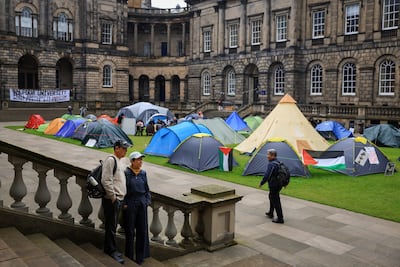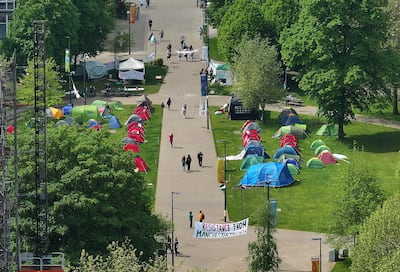Live updates: Follow the latest on Israel-Gaza
UK universities and staff have said they will avoid taking a stance on issues affecting global politics in the future, after pro-Palestinian students accused them of double standards, according to a report.
Dozens of universities across the UK saw students camping out for weeks in protest over Israel’s military campaign in Gaza last year, in a movement that has been compared to the student protests over the US war in Vietnam.
The camps began at the University of Warwick in April last year and spread across 35 more institutions, until the protesters were evicted towards the end of the academic year.
Although they were tolerated on the grounds of freedom of speech, they caused lasting tensions between students and the institution, according to the Higher Education Policy Institute’s report on the pro-Palestine camps and their effects on university life.
Pro-Palestinian protesters accused their universities of “complicity” with Israel, urging them to divest from them and do more to support Palestinian scholarships and link up with universities in Gaza, as they had done for Ukraine.
The strong stance that universities had taken in support of Ukraine after Russia’s invasion, fuelled the protesters' accusations that university administrators were “hypocrites”.
“After Russia invaded Ukraine, [my institution] immediately reviewed all investments, gave special access to wellbeing for Ukrainian students and created research partnerships with [Ukrainian universities]. None of this happened with Palestinian universities," a student protester said in the report.
University staff interviewed for the survey said that the “clear” UK government position on Ukraine and the requirements of research regulators to withdraw funds associated with Russia had made it easier for them to take a position.
But in the Israel-Gaza conflict, they were “caught between” the UK government’s position and the demands of the students. Relations between the university administration and students appeared to have broken down entirely.
Some staff described “extremely difficult meetings” with the protesters, where one vice chancellor complained of being “ranted at” for an hour. Students said they were treated with “suspicion” and “fear”, rather than as “human beings”.
The report also found instances where the protesters were not students or part of the institution – and has called for more measures to prevent such activists from joining the camps.
The camps exacerbated fears of rising anti-Semitism and Islamophobia on campus. Protesters said they experienced Islamophobic discrimination by institutions and students, and some were victims of harassment and assault. Jewish students said that anti-Semitic slogans had been written in Arabic to disguise them, or with the word “Jew” replaced with “Zionist”.
The report suggests more should have been done by the universities to support Jewish students, university staff and the protesters as community tension was raised.
“Now a ceasefire between Israel and Hamas has been signed, it is a good time for universities to reflect on this fraught period of student activism,” said the report’s author, Josh Freeman. “Institutions should learn the lessons of the protests. Supporting the free speech of protesters and others was and should be a key priority.
“More should have been done to support vulnerable members of the academic community, including Jewish students and staff, and the protesters themselves.”
The universities blamed the Office for Students, the regulator in England, for “failing to clarify” the boundaries of free speech on campus. Some slogans that were considered to be anti-Semitic by Jewish student bodies were protected by the Higher Education Act 2023, a law passed by the former Conservative government, which was aimed at defending academic freedom on campus.
The new Labour government announced it would make significant changes to the Act in January, after delaying its implementation. Several universities were called into the Prime Minister’s residence in Downing Street at the time to discuss anti-Semitism, although none said they had changed their behaviour as a result, the report found.
A representative of the Jewish community accused the former government of a “see-saw”approach, whereby it “cared strongly” about anti-Semitism on campus, but was in a difficult position because of the act.
Adam Habib, vice chancellor at the School of Oriental and African Studies University of London, said the report showed universities were a “long way” from living “tolerantly in a cosmopolitan community”.
“If we are going to learn lessons, then we need to agree on the first principles of how we should agree to differ, the parameters of peaceful protest and the accountability mechanisms for those that violate them,” Mr Habib said. “This report suggests that we are a long way from that ideal but it is a necessary starting point in that journey.”
'Nightmare Alley'
Director:Guillermo del Toro
Stars:Bradley Cooper, Cate Blanchett, Rooney Mara
Rating: 3/5
Quick facts on cancer
- Cancer is the second-leading cause of death worldwide, after cardiovascular diseases
- About one in five men and one in six women will develop cancer in their lifetime
- By 2040, global cancer cases are on track to reach 30 million
- 70 per cent of cancer deaths occur in low and middle-income countries
- This rate is expected to increase to 75 per cent by 2030
- At least one third of common cancers are preventable
- Genetic mutations play a role in 5 per cent to 10 per cent of cancers
- Up to 3.7 million lives could be saved annually by implementing the right health
strategies
- The total annual economic cost of cancer is $1.16 trillion
'The Sky is Everywhere'
Director:Josephine Decker
Stars:Grace Kaufman, Pico Alexander, Jacques Colimon
Rating:2/5
Sole survivors
- Cecelia Crocker was on board Northwest Airlines Flight 255 in 1987 when it crashed in Detroit, killing 154 people, including her parents and brother. The plane had hit a light pole on take off
- George Lamson Jr, from Minnesota, was on a Galaxy Airlines flight that crashed in Reno in 1985, killing 68 people. His entire seat was launched out of the plane
- Bahia Bakari, then 12, survived when a Yemenia Airways flight crashed near the Comoros in 2009, killing 152. She was found clinging to wreckage after floating in the ocean for 13 hours.
- Jim Polehinke was the co-pilot and sole survivor of a 2006 Comair flight that crashed in Lexington, Kentucky, killing 49.
AI traffic lights to ease congestion at seven points to Sheikh Zayed bin Sultan Street
The seven points are:
Shakhbout bin Sultan Street
Dhafeer Street
Hadbat Al Ghubainah Street (outbound)
Salama bint Butti Street
Al Dhafra Street
Rabdan Street
Umm Yifina Street exit (inbound)
Specs
Engine: Electric motor generating 54.2kWh (Cooper SE and Aceman SE), 64.6kW (Countryman All4 SE)
Power: 218hp (Cooper and Aceman), 313hp (Countryman)
Torque: 330Nm (Cooper and Aceman), 494Nm (Countryman)
On sale: Now
Price: From Dh158,000 (Cooper), Dh168,000 (Aceman), Dh190,000 (Countryman)
UAE currency: the story behind the money in your pockets
COMPANY PROFILE
Name: Akeed
Based: Muscat
Launch year: 2018
Number of employees: 40
Sector: Online food delivery
Funding: Raised $3.2m since inception
ICC T20 Rankings
1. India - 270 ranking points
2. England - 265 points
3. Pakistan - 261 points
4. South Africa - 253 points
5. Australia - 251 points
6. New Zealand - 250 points
7. West Indies - 240 points
8. Bangladesh - 233 points
9. Sri Lanka - 230 points
10. Afghanistan - 226 points
Most sought after workplace benefits in the UAE
- Flexible work arrangements
- Pension support
- Mental well-being assistance
- Insurance coverage for optical, dental, alternative medicine, cancer screening
- Financial well-being incentives
UAE currency: the story behind the money in your pockets
The Two Popes
Director: Fernando Meirelles
Stars: Anthony Hopkins, Jonathan Pryce
Four out of five stars
COMPANY%20PROFILE
%3Cp%3E%3Cstrong%3ECompany%20name%3A%3C%2Fstrong%3E%20Switch%20Foods%3Cbr%3E%3Cstrong%3EStarted%3A%3C%2Fstrong%3E%202022%3Cbr%3E%3Cstrong%3EFounder%3A%3C%2Fstrong%3E%20Edward%20Hamod%3Cbr%3E%3Cstrong%3EBased%3A%3C%2Fstrong%3E%20Abu%20Dhabi%2C%20UAE%3Cbr%3E%3Cstrong%3EIndustry%3A%3C%2Fstrong%3E%20Plant-based%20meat%20production%3Cbr%3E%3Cstrong%3ENumber%20of%20employees%3A%3C%2Fstrong%3E%2034%3Cbr%3E%3Cstrong%3EFunding%3A%3C%2Fstrong%3E%20%246.5%20million%3Cbr%3E%3Cstrong%3EFunding%20round%3A%3C%2Fstrong%3E%20Seed%3Cbr%3E%3Cstrong%3EInvestors%3A%3C%2Fstrong%3E%20Based%20in%20US%20and%20across%20Middle%20East%3C%2Fp%3E%0A
Conflict, drought, famine
Estimates of the number of deaths caused by the famine range from 400,000 to 1 million, according to a document prepared for the UK House of Lords in 2024.
It has been claimed that the policies of the Ethiopian government, which took control after deposing Emperor Haile Selassie in a military-led revolution in 1974, contributed to the scale of the famine.
Dr Miriam Bradley, senior lecturer in humanitarian studies at the University of Manchester, has argued that, by the early 1980s, “several government policies combined to cause, rather than prevent, a famine which lasted from 1983 to 1985. Mengistu’s government imposed Stalinist-model agricultural policies involving forced collectivisation and villagisation [relocation of communities into planned villages].
The West became aware of the catastrophe through a series of BBC News reports by journalist Michael Buerk in October 1984 describing a “biblical famine” and containing graphic images of thousands of people, including children, facing starvation.
Band Aid
Bob Geldof, singer with the Irish rock group The Boomtown Rats, formed Band Aid in response to the horrific images shown in the news broadcasts.
With Midge Ure of the band Ultravox, he wrote the hit charity single Do They Know it’s Christmas in December 1984, featuring a string of high-profile musicians.
Following the single’s success, the idea to stage a rock concert evolved.
Live Aid was a series of simultaneous concerts that took place at Wembley Stadium in London, John F Kennedy Stadium in Philadelphia, the US, and at various other venues across the world.
The combined event was broadcast to an estimated worldwide audience of 1.5 billion.
Key findings of Jenkins report
- Founder of the Muslim Brotherhood, Hassan al Banna, "accepted the political utility of violence"
- Views of key Muslim Brotherhood ideologue, Sayyid Qutb, have “consistently been understood” as permitting “the use of extreme violence in the pursuit of the perfect Islamic society” and “never been institutionally disowned” by the movement.
- Muslim Brotherhood at all levels has repeatedly defended Hamas attacks against Israel, including the use of suicide bombers and the killing of civilians.
- Laying out the report in the House of Commons, David Cameron told MPs: "The main findings of the review support the conclusion that membership of, association with, or influence by the Muslim Brotherhood should be considered as a possible indicator of extremism."





